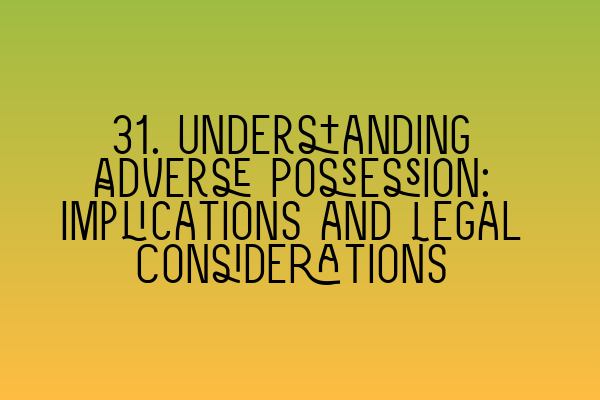Understanding Adverse Possession: Implications and Legal Considerations
Adverse possession is a legal concept that has garnered significant attention and debate in the realm of property law. It refers to a situation where a person who does not have legal ownership of a property gains ownership rights through their continuous and exclusive possession of the property over a specified period of time. In this article, we will delve into the implications and legal considerations surrounding adverse possession, shedding light on the intricacies of this complex area of law.
Why is Adverse Possession Important?
Adverse possession is important because it allows for the regularisation of property ownership in cases where the legal title has become uncertain or disputed. It provides a mechanism for resolving ownership disputes that have arisen due to long-term possession and use of property.
Moreover, adverse possession serves as a means to promote the efficient use of land. By rewarding individuals who put otherwise neglected properties to use, adverse possession encourages the productive utilization of land resources.
Requirements for Adverse Possession
Before delving into the legal implications of adverse possession, it’s crucial to understand the requirements that must be met for a claim of adverse possession to be successful. These requirements may vary depending on jurisdiction, but the following elements are generally considered:
- Actual Possession: The claimant must physically possess the property in question. This means that they must have exclusive control and occupation of the property, treating it as if they were the true owner.
- Open and Notorious Possession: The claimant’s possession of the property must be open and obvious to the public and actual owner. They cannot hide their occupation or possession of the property.
- Hostile Possession: The claimant must possess the property without the permission or consent of the true owner. They must have entered into possession with the intention to assert ownership rights, even if the claimant does not have a legal basis for those rights.
- Continuous Possession: The claimant’s possession must be continuous and uninterrupted for a specified period of time, typically ranging from several years to a couple of decades, depending on the jurisdiction.
- Exclusive Possession: The claimant must possess the property exclusively, meaning that their possession must be undisturbed by the true owner or other unauthorized persons.
Meeting these requirements is essential for a successful adverse possession claim. It is important to consult with a qualified property law solicitor to determine whether your situation meets these criteria and to guide you through the legal process.
The Implications of Adverse Possession
Adverse possession has significant legal implications for both the true owner and the adverse possessor. For the true owner, adverse possession can result in the loss of ownership rights if they fail to take action within the prescribed time period to challenge the adverse possessor’s claim.
On the other hand, the adverse possessor stands to gain legal title to the property if they can establish their claim successfully. This can lead to considerable financial and psychological implications, as the individual may have invested time, money, and effort into developing the property during their possession.
It is important to note that adverse possession does not confer immediate rights or ownership. The adverse possessor must go through a legal process and satisfy the specific requirements of adverse possession to acquire legal ownership of the property.
Legal Considerations in Adverse Possession
Adverse possession cases can be highly complex, involving various legal considerations that require expert analysis and understanding. Some of the key legal aspects to consider include:
- Statutory Period: Understanding the statutory period for adverse possession in your jurisdiction is crucial. Different jurisdictions have different timeframes within which adverse possession claims can be made, and it is essential to be aware of these limitations.
- Notice Requirements: In some jurisdictions, adverse possessors are required to notify the true owner of their claim. Failure to provide this notice may affect the validity of the claim.
- Good Faith: Some jurisdictions require adverse possessors to have acted in good faith, meaning that they genuinely believed they were the true owners of the property. The absence of good faith may impact the outcome of the claim.
- Legal Defenses: True owners have the opportunity to assert legal defenses to challenge adverse possession claims. These defenses may include previous permission given to the adverse possessor, mistakes in boundaries, or actions taken to interrupt the adverse possession period.
- Consequences of Failure: If an adverse possession claim fails, the adverse possessor may be subject to legal action by the true owner, leading to potential financial and legal consequences.
Given the legal complexities involved, engaging the services of an experienced property law solicitor is crucial when dealing with adverse possession cases. A solicitor who specializes in property law and land law can navigate the intricacies of the legal process, ensuring that your rights and interests are protected throughout.
Conclusion
Adverse possession is a fascinating and nuanced area of property law that requires a deep understanding of legal principles and regulations. Its implications and legal considerations can significantly impact both the true owner and the adverse possessor.
If you are involved in an adverse possession case or find yourself in a situation where adverse possession may be relevant, it is vital to seek professional legal advice. A skilled solicitor with expertise in property law and land law can guide you through the legal process, ensuring that your rights and interests are protected.
To learn more about the SQE exams and access valuable preparation resources, visit our related articles:
